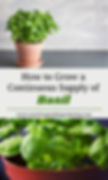How to Grow Basil from Seed
- Krista Green
- Jun 11, 2020
- 3 min read
Updated: Jan 23, 2025
It seems people either have a love or hate relationship with growing basil from seed. If you are doing something wrong, basil has a tendency to wilt and die. When done right, your basil plant will flourish and grow a continuous supply of fresh basil. Homemade pesto anyone? Let's take a look at some tips on how to grow basil from seed indoors or outdoors.
Basil Varieties
There are many different varieties and specialty flavors of basil. The most common type is sweet basil. Other varieties include purple, lemon and Thai basil. My favorite variety is the Genovese Basil.
How to Plant Basil Seeds
When seeding sweet basil, plant seeds about two inches apart in your pot and cover with a thin layer of soil then water with warm water. This means that for a 6-inch round pot, you should end up with about 5 seeds.
Zappa Seeds has a beautiful mixed blend basil, Genovese basil, and large-leaf Italian basil.
Print out my Seeding Guide to find out when I like to plant my spring basil.
How to Grow Basil From Cuttings
If you have access to an established basil plant you can easily grow basil from cuttings by cutting a 4-inch section off and placing it in water for a week. It should begin to grow roots in that time. Once visible roots are established plant your basil into a pot with soil.

Keep Basil Warm
Basil does NOT like the cold. I suggest starting basil indoors in early spring and growing it in a pot. Anything below 6° C (43°F) is too cold for basil. For those of us gardening in the zone 3 climate this means being very careful when leaving basil plants outdoors. I like to grow my basil in a pot year-round so it is easy to bring inside when there is a risk of the temperature dropping.
Provide Adequate Light
Basil does best in a location where it will receive at least 6 to 8 hours of sunlight a day.
How to Water Basil
One of the common mistakes made when growing basil is overwatering it. Basil does not like wet leaves or soaking wet soil! Plant basil in well-drained soil and if anything, keep the soil on the dry side. Be sure not to over-water basil plants! This means allowing the soil to dry out somewhat between watering. Water your basil at the base of the plant to avoid wet leaves.
How to Harvest Basil
Harvest basil regularly to encourage more growth. Begin harvesting once there are more than 6 leaves on a stem. Always take from the top of the plant and cut the stem down to the next intersecting leaves. This will cause it to grow two new stems in place of the one you cut and your plant will grow larger and bushier. If you notice your basil beginning to form flowers, snip that part off to encourage more leaf production.
If you want to make pesto, basil can be frozen until you have gathered enough for your pesto recipe.

Basil Companion Plants
Tomatoes are known as the perfect companion plant for basil. Basil deters pests that attack tomato plants and some say tomatoes taste better when planted next to basil. Other companion plants for basil include cabbage, asparagus, oregano and peppers.
Basil does better in the company of other vegetables vs. herbs with the exception being chamomile and oregano.
Tip: Plant basil in pots on your deck to deter mosquitoes!
Check out my full printable companion planting guide.
If you have found this article helpful please consider subscribing to my blog (the bottom of the home page) and sharing this post. Also follow me on Pinterest, Instagram, Facebook and/or YouTube.
.jpg)


